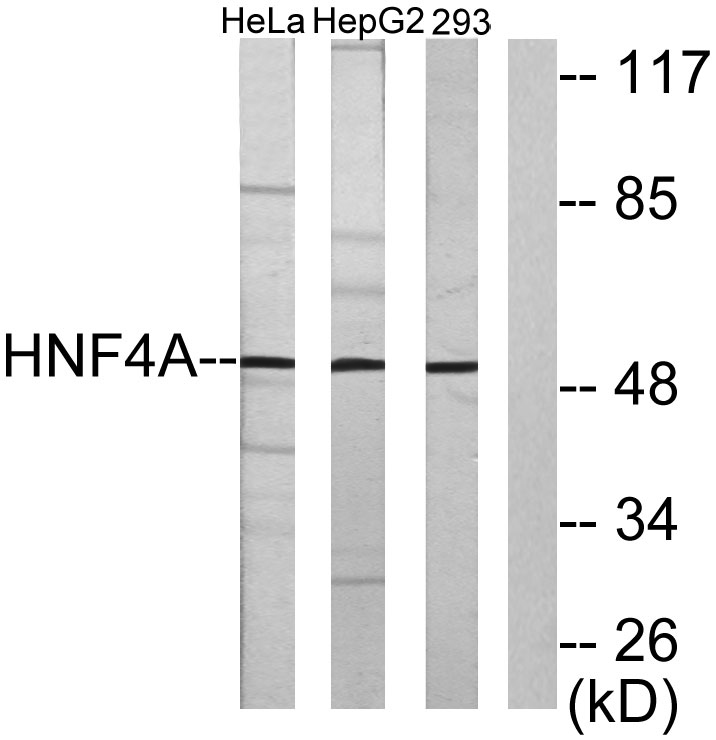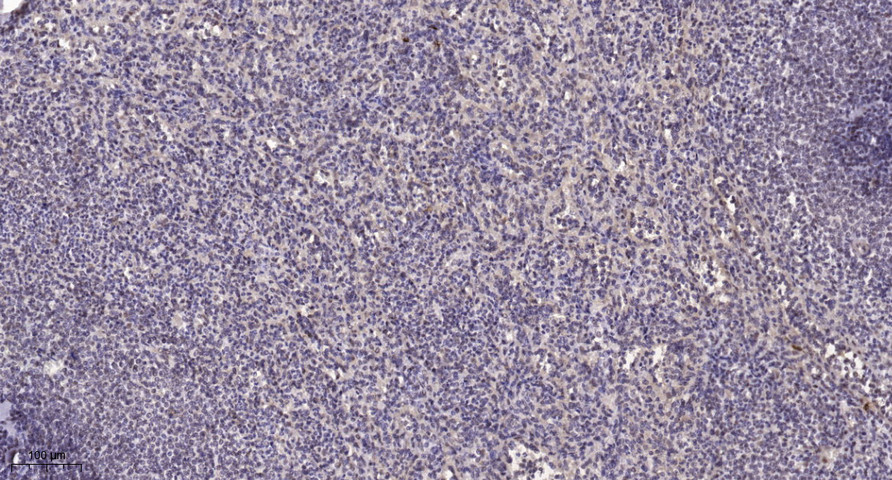HNF-4α/γ Polyclonal Antibody
- Catalog No.:YT2190
- Applications:WB;IHC;IF;ELISA
- Reactivity:Human;Mouse;Rat
- Target:
- HNF-4α/γ
- Fields:
- >>AMPK signaling pathway;>>Maturity onset diabetes of the young
- Gene Name:
- HNF4A/HNF4G
- Protein Name:
- Hepatocyte nuclear factor 4-alpha/gamma
- Human Gene Id:
- 3172/3174
- Human Swiss Prot No:
- P41235/Q14541
- Mouse Gene Id:
- 15378/30942
- Rat Gene Id:
- 25735
- Rat Swiss Prot No:
- P22449
- Immunogen:
- The antiserum was produced against synthesized peptide derived from human HNF4 alpha/gamma. AA range:91-140
- Specificity:
- HNF-4α/γ Polyclonal Antibody detects endogenous levels of HNF-4α/γ protein.
- Formulation:
- Liquid in PBS containing 50% glycerol, 0.5% BSA and 0.02% sodium azide.
- Source:
- Polyclonal, Rabbit,IgG
- Dilution:
- WB 1:500 - 1:2000. IHC 1:100 - 1:300. ELISA: 1:20000.. IF 1:50-200
- Purification:
- The antibody was affinity-purified from rabbit antiserum by affinity-chromatography using epitope-specific immunogen.
- Concentration:
- 1 mg/ml
- Storage Stability:
- -15°C to -25°C/1 year(Do not lower than -25°C)
- Other Name:
- HNF4A;HNF4;NR2A1;TCF14;Hepatocyte nuclear factor 4-alpha;HNF-4-alpha;Nuclear receptor subfamily 2 group A member 1;Transcription factor 14;TCF-14;Transcription factor HNF-4;HNF4G;NR2A2;Hepatocyte nuclear factor 4-gamma;HNF-4-ga
- Observed Band(KD):
- 52kD
- Background:
- The protein encoded by this gene is a nuclear transcription factor which binds DNA as a homodimer. The encoded protein controls the expression of several genes, including hepatocyte nuclear factor 1 alpha, a transcription factor which regulates the expression of several hepatic genes. This gene may play a role in development of the liver, kidney, and intestines. Mutations in this gene have been associated with monogenic autosomal dominant non-insulin-dependent diabetes mellitus type I. Alternative splicing of this gene results in multiple transcript variants encoding several different isoforms. [provided by RefSeq, Apr 2012],
- Function:
- alternative products:Additional isoforms seem to exist,disease:Defects in HNF4A are the cause of maturity onset diabetes of the young type 1 (MODY1) [MIM:125850]; also shortened MODY-1. MODY [MIM:606391] is a form of diabetes that is characterized by an autosomal dominant mode of inheritance, onset in childhood or early adulthood (usually before 25 years of age) and a primary defect in insulin secretion. The clinical phenotype of MODY1 is characterized by severe insulin secretory defects, and by major hyperglycemia associated with microvascular complications.,function:Transcriptionally controlled transcription factor. Binds to DNA sites required for the transcription of alpha 1-antitrypsin, apolipoprotein CIII, transthyretin genes and HNF1-alpha. May be essential for development of the liver, kidney and intestine.,miscellaneous:Binds fatty acids.,online information:Hepatocyte nuclear fac
- Subcellular Location:
- Nucleus.
- Expression:
- Kidney,Liver,
- June 19-2018
- WESTERN IMMUNOBLOTTING PROTOCOL
- June 19-2018
- IMMUNOHISTOCHEMISTRY-PARAFFIN PROTOCOL
- June 19-2018
- IMMUNOFLUORESCENCE PROTOCOL
- September 08-2020
- FLOW-CYTOMEYRT-PROTOCOL
- May 20-2022
- Cell-Based ELISA│解您多样本WB检测之困扰
- July 13-2018
- CELL-BASED-ELISA-PROTOCOL-FOR-ACETYL-PROTEIN
- July 13-2018
- CELL-BASED-ELISA-PROTOCOL-FOR-PHOSPHO-PROTEIN
- July 13-2018
- Antibody-FAQs
- Products Images

- Western Blot analysis of various cells using HNF-4α/γ Polyclonal Antibody

- Western blot analysis of lysates from HepG2, HeLa, and 293 cells, using HNF4 alpha/gamma Antibody. The lane on the right is blocked with the synthesized peptide.

- Immunohistochemical analysis of paraffin-embedded human spleen. 1, Tris-EDTA,pH9.0 was used for antigen retrieval. 2 Antibody was diluted at 1:200(4° overnight.3,Secondary antibody was diluted at 1:200(room temperature, 45min).



